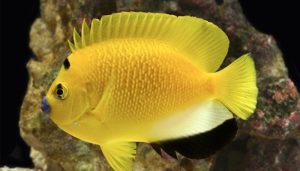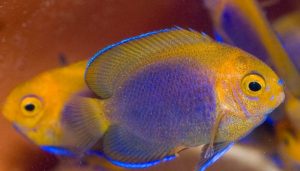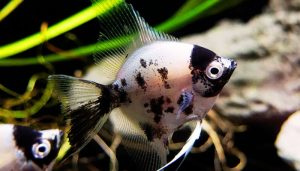Do you have a bloated guppy fish in your aquarium? Acting quickly to save your fish and prevent further health complications is essential.
Bloating can indicate a severe issue, such as dropsy or constipation, so taking immediate action is crucial. But don’t worry; there are several things you can do to help your fish recover.
This blog post explores three surefire ways to save your bloated guppy fish. From adjusting their diet to providing proper water conditions, we’ll cover everything you need to know to help your fish return to their happy, healthy self.
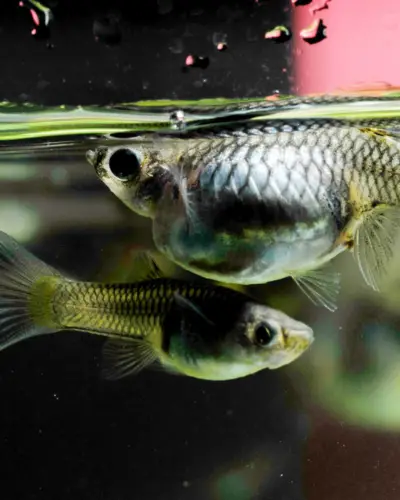
With these tips, you can identify the root cause of your guppy’s bloating and take the necessary steps to remedy the situation. Don’t let a bloated belly bring your guppy down. Learn how to save your beloved fish and keep them swimming strong!
Table of Contents
ToggleUnderstanding Bloated Guppy Fish (Dropsy)
Dropsy is a common condition that can affect guppies and other fish species. It is characterized by a swollen, bloated belly and scales that stick out from the body. Dropsy is usually caused by a bacterial infection that affects the fish’s kidneys, leading to fluid retention and swelling.
Other symptoms of dropsy include lethargy, loss of appetite, and difficulty swimming. Unfortunately, dropsy is often fatal, but early intervention and treatment can improve the fish’s chances of survival.
Treatment options include quarantine, antibiotic medication, and maintaining good water quality. It’s essential to monitor your guppies for signs of dropsy and take action if necessary to prevent the spread of infection and ensure the health of your fish.
Guppy Dropsy: Causes and Symptoms
Dropsy is a common ailment that affects guppies and other tropical fish, causing their abdomen to swell abnormally.
It is usually a symptom of an underlying issue, such as bacterial infection, poor water quality, or organ failure. The swollen abdomen is often noticeable, giving the fish a bloated appearance, and may lead to other complications if not treated promptly.
Signs of Dropsy in Guppies
If your guppy is suffering from dropsy, you may observe the following symptoms:
- Guppy swollen belly: The most prominent sign of dropsy is a swollen belly in guppies, making guppy looks bloated.
- Lethargy and reduced activity: Infected guppies may become sluggish and lack interest in their surroundings.
- Loss of appetite: Dropsy can cause a decrease in appetite, leading to reduced feeding or complete refusal to eat.
- Raised scales: In severe cases, the fish’s scales may stand out, giving them a “pinecone” appearance.
- Labored breathing: Infected guppies may exhibit difficulty breathing, often seen as rapid or heavy gill movement.
- Pale coloration: The affected guppies may lose their vibrant colors and appear pale or dull.
What Should You Do if Your Guppy is Bloated?
If you notice that your guppy has a bloated belly, it could be a sign of several different issues. Here are some steps you can take to help your guppy:
- Check for signs of dropsy: Dropsy is a condition where the fish’s body swells, and the scales stick out. If your guppy has dropsy, it may be too late to save it, as this condition is often fatal. However, if you catch it early enough, you can treat it with medication.
- Check if your guppy is pregnant: Female guppies are known for their ability to reproduce quickly and easily. If you suspect your guppy is pregnant, it is normal for the guppy’s stomach to be bloated. In this case, you don’t need to do anything special, but you may want to prepare for the arrival of guppy fry.
- Check water parameters: Poor water quality can cause a range of health problems for your fish. Ensure the fish tank’s water is clean and has the appropriate water temperature, pH, and other parameters.
- Consider if your guppy is constipated: If it is not passing waste properly, it can cause bloating. You can feed your guppy a pea, which helps alleviate constipation.
- Feed your guppy a balanced diet: Feeding your guppy too much or giving them the wrong food can cause bloating. Make sure that your guppy is getting a balanced diet that is appropriate for their age and size.
- Quarantine sick fish: If you suspect your guppy has an illness, it is important to isolate it from the rest of the population to prevent the spreading of any contagious diseases.
If you notice that your guppy is bloated, monitoring their behavior and taking necessary action is essential. A bloated guppy stomach can be a sign of a severe condition, so it’s always better to err on the side of caution and seek advice from a veterinarian or experienced aquarist if unsure how to proceed.
What Causes Constipation in Guppies?
Constipation is a common issue among guppies that may lead to bloat and a distended belly. One of the leading causes of constipation in guppies is overfeeding.
When guppies are overfed, they consume more food than their digestive system can handle, resulting in difficulty in passing waste.
Another cause of constipation can be a lack of fiber in their diet. Guppies in the wild consume various foods, including plants and insects, which provide essential fiber.
However, in an aquarium setting, their diet often lacks this necessary fiber. Additionally, some guppy owners may feed their fish a diet mainly consisting of pellet or flake food, which can be low in thread.
To prevent constipation in guppies, it is crucial to maintain a mixed diet that includes a variety of food sources, including fiber-rich options such as peas.
Can You Treat Dropsy In Guppies?
Dropsy is a common illness that can affect guppies. Fortunately, it is possible to treat dropsy in these fish. The first step is to isolate the sick guppy in a separate aquarium to prevent the spread of the bacterial infection.
The hospital tank water must be kept clean and toxins-free to start the treatment. Perform regular water changes are essential to maintain a healthy and stress-free tank environment for the fish.
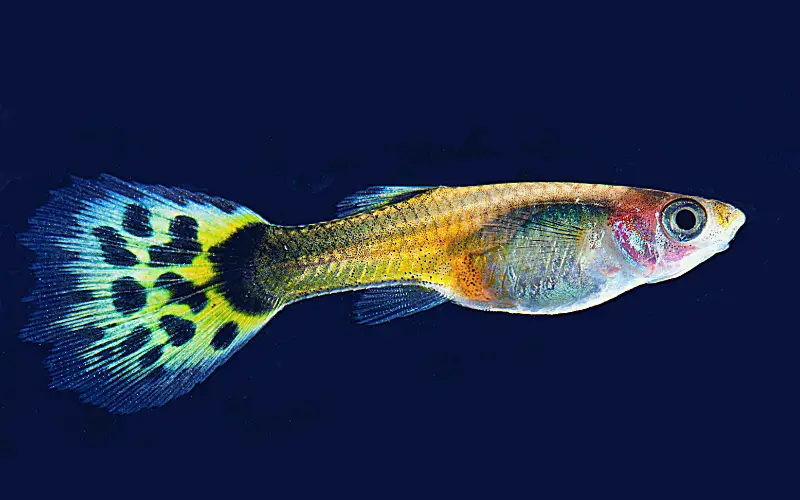
Additionally, it is important to dose the tank with appropriate medication to help cure dropsy. Antibiotics can be used to target the underlying bacterial infection causing the illness.
Feeding the sick guppy a balanced and nutritious diet is also recommended to boost its immunity and aid in the healing process. With proper care and treatment, there is a good chance of successfully treating dropsy in guppies and improving the health of sick fish.
3 Surefire Ways to Prevent Dropsy in Guppy Fish
1. Improve Water Quality and Parameters
Maintaining a clean environment for your guppies prevents and treats dropsy. Here’s what you can do to ensure optimal water conditions:
- Regular water changes: Daily partial water changes to check ammonia and nitrate levels. Aim for a 20-30% water change every week.
- Monitor water parameters: Use test kits to check for ammonia, nitrite, nitrate, and pH levels in guppies aquarium. Keep them within the suitable range for guppies (ammonia and nitrite: 0 ppm, nitrate: below 20 ppm, pH: 7.0-8.0).
- Proper filtration: Invest in a reliable aquarium filter to keep the water clean and remove harmful substances.
2. Feed a Balanced Diet and Avoid Overfeeding
Feeding your guppies a balanced diet is crucial for their health and immunity. Avoid overfeeding, as it can lead to constipation and contribute to dropsy. Here are some feeding tips:
- Variety in diet: Offer a mix of high-quality commercial guppy flakes, pellets, frozen, and live foods to provide essential nutrients.
- Controlled portions: Feed your guppies small amounts 2-3 times a day, giving them only what they can consume within a few minutes.
3. Isolate and Treat Affected Fish
If you notice one of your guppies showing symptoms of dropsy, it is crucial to isolate the affected fish to prevent the condition from spreading to others. Here’s what you can do:
- Prepare a quarantine tank: Set up a separate tank with appropriate water parameters and add a heater to maintain the correct temperature (around 78-80°F).
- Medication: Consult a veterinarian or a qualified fish expert to identify the cause of dropsy and provide appropriate treatment.
How to Tell if Guppy Fish is Pregnant?
You can look for several key indicators to determine if a female guppy fish is pregnant and about to give birth to fry (baby guppies). Here are some of the signs that a guppy fish is pregnant:
- A larger belly. The bloated guppy female will gradually grow as she approaches giving birth. The guppy stomach bloated may take on a somewhat boxy shape.
- A darker gravid spot. The gravid spot is a dark dot near the female guppy’s vent. As the pregnancy progresses, the gravid spot will become darker.
- Behavioral changes. A pregnant guppy may become more aggressive tank mates, lose her appetite, and spend more time resting at the bottom of the tank.
- The appearance of fry. In the days leading up to giving birth, you may see tiny fry swimming around in the female guppy’s belly.
If you see any of these signs, your guppy is likely pregnant. The average gestation period for guppies is about 28 days, so you can expect her to give birth within a few weeks.
Here are some tips for caring for a pregnant guppy:
- Keep the water parameters stable. Guppies are sensitive to changes in water quality, so it’s essential to keep the water parameters steady during pregnancy. This means testing the water regularly and ensuring the ammonia, nitrite, nitrate, and pH levels are within the recommended ranges.
- Provide a quiet environment. Pregnant guppies can be easily stressed, so a calm environment is essential. Avoid placing the tank in a noisy area or near a draft.
- Feed a high-quality diet. A pregnant guppy needs a high-quality diet to support the growth of her fry. Feed her a diet that is rich in protein and vitamins.
Once the female guppy gives birth, the fry can fend for themselves. You can leave them in the aquarium with their mother or separate them to control the guppy population.
How Often Can Female Guppy Fish Get Pregnant?
Female guppy fish, also known as guppies, can get pregnant every 28 days. These colorful fish are commonly found in aquariums, where they reproduce significantly.
The reproductive process begins when a male guppy fish fertilizes the eggs inside the female guppy’s body. After a gestation period of around 21 to 30 days, the female guppy gives birth to live young, known as guppy fry.
These fry are immediately able to swim and fend for themselves. However, since guppies are known for their prolific breeding, it is essential to carefully manage the guppy population in the aquarium to avoid overcrowding.
Additionally, it is advisable to keep the males and females separate if you do not wish to breed them constantly. Other fish, like betta fish, may also be housed with guppies as long as they are compatible.
Commonly Asked Questions (FAQs)
Can dropsy be cured?
Dropsy can be challenging to treat, but early detection and proper care can increase the chances of recovery. In some cases, dropsy may be a symptom of an irreversible condition, making it difficult to cure.
Is dropsy Disease contagious?
Dropsy is not contagious but often results from an underlying bacterial infection, which can be transmitted to other fish in the same aquarium. Isolating affected fish can prevent the spread of disease.
How can I prevent dropsy in guppies?
To prevent dropsy, maintain good water quality, feed a balanced diet, and avoid overfeeding. Regular observation and prompt action can help detect any early signs of illness.
Can pregnant guppies get dropsy?
Pregnant female guppies can be susceptible to dropsy, especially if they are stressed or have a weakened immune system.
What is dropsy disease in guppy fish?
Dropsy disease, also known as edema or bloat, is a common ailment in guppies that causes the fish to develop a swollen abdomen.
What are the symptoms of dropsy in guppy fish?
The symptoms of dropsy in guppy fish include a swollen belly, raised scales, loss of appetite, lethargy, and bloating.
What causes dropsy in guppies?
Dropsy in guppies is often caused by bacterial infection, specifically by the bacteria Aeromonas and Pseudomonas, which result from poor water quality, overcrowding, or stress.
How can I tell if my female guppy is pregnant?
A pregnant female guppy will have a noticeably swollen and rounded belly, and you may see dark triangular spots called gravid spots near her anal fin.
What should I do if my guppy fish has a swollen belly?
If your guppy fish has a swollen belly, it may be a sign of dropsy or constipation. It’s essential to monitor their behavior and water conditions and act appropriately and closely.
How often should I feed my guppy fish to prevent bloating?
It is recommended to feed your guppy fish small portions of fish food twice a day to prevent overfeeding, which can lead to bloating and digestive issues.
How can I keep my guppies healthy and prevent dropsy?
To keep your guppies healthy and prevent dropsy, maintain good water quality, avoid overcrowding, provide a balanced diet, and regularly monitor their behavior and appearance.
What can be done to cure dropsy in guppy fish?
Unfortunately, dropsy in guppy fish is often fatal. It is essential to isolate the infected fish and maintain clean water conditions. Some recommend using antibiotic treatments, but success rates can vary.
How can I tell if my guppy fish is constipated?
A constipated guppy fish may appear bloated and have difficulty passing feces. Providing a balanced diet and ensuring proper water conditions to prevent constipation is crucial.
How do I know if a new fish is causing dropsy in my guppies?
If dropsy occurs shortly after introducing new fish into the aquarium, it could be a sign that the fresh fish is carrying the bacteria that causes dropsy. Quarantining new fish before submitting them to the main tank can help prevent this.
Why does my male guppy look bloated?
A male guppy may look bloated due to overfeeding or constipation. Poor water quality or bacterial infection can also cause bloating. Monitoring your bloated guppy male behavior and taking necessary action to prevent further health complications is essential.
Conclusion
In conclusion, bloated guppy diseases can be worrying for any fish owner. Still, with the proper understanding and care, you can help your fish recover and prevent future health issues. By monitoring their diet, water conditions, and overall health, you can identify the root cause of their bloating and take steps to remedy the situation. Remember, prevention is always better than cure, so maintain good water quality and a healthy, balanced diet for your guppies. If you notice any signs of bloating or other health concerns, act fast and seek advice from a veterinarian or experienced aquarist.
With these three surefire ways to save your bloated guppy stomach, you can be confident in providing the best care for your guppy fish. So don’t let a bloated belly bring your guppies down; take action and ensure they stay happy and healthy for years!
You might also like
- Swim Bladder Disease Guppy: 58 Seconds to Save Your Fish!
- Constipated Guppy Fish: Symptoms, Causes & Best Treatment!
- 5 Deadly Guppy Fish Diseases You Need to Avoid (Complete Guide)
- Can Guppies Breed with Mollies? Molly Guppy Hybrid (Solved)
- Are Guppies Hardy Fish: 5 Shocking Health Risks Revealed!
- My Water Tests Perfect but My Fish Keep Dying (Solved)
- Guppy Dropsy or Pregnant: Don’t Miss These Warning Signs!
- Pregnant Guppy When to Separate: (A Comprehensive Guide)
- Why Are My Guppy Fish Dying: (5 Major Causes & Best Solutions)
- Guppy Poop Hanging: Reasons, Prevention & Best Solution!
- Why Is My Pregnant Guppy Not Giving Birth: 3 Causes & Quick Help!


